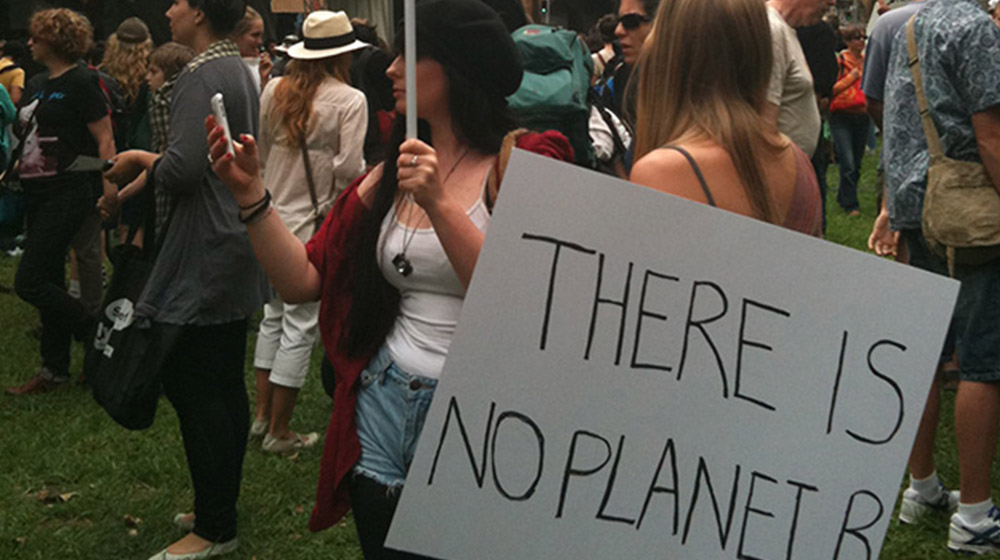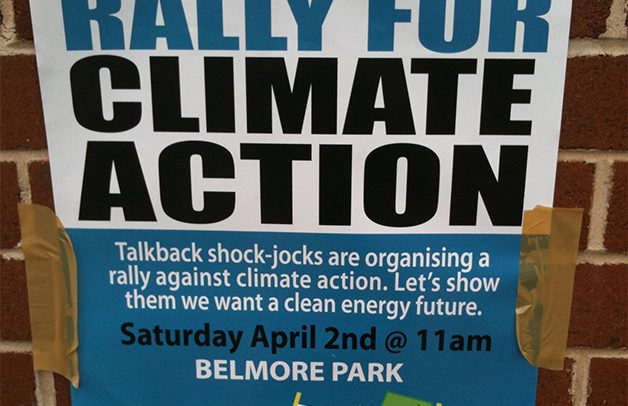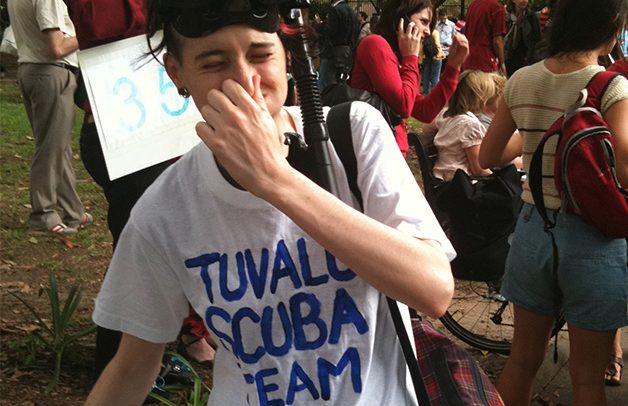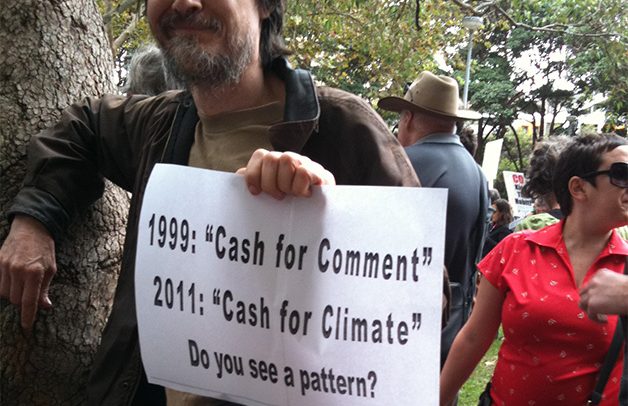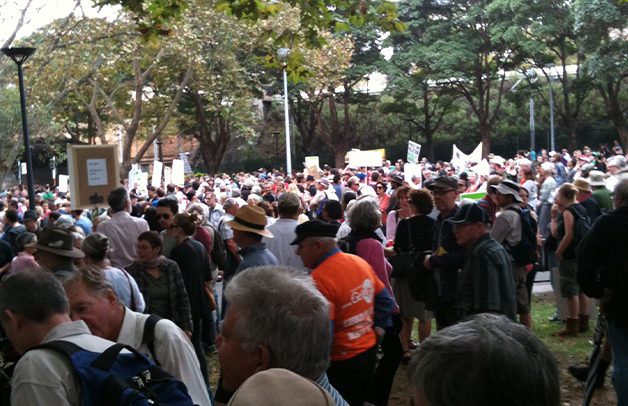True Colours
I took this photo at a Climate March some time ago. The attendees might look a little older than you’re used to – because it was almost ten years ago. It was the first time I’d ever seen the slogan ‘There Is No Planet B’.
There Is No Planet B
I took this photo at a Climate March I attended on 2 April 2011. It was the first time I’d ever seen the slogan ‘There is no Planet B’.
If you’ve seen David Attenborough’s A Life On Our Planet, you’ll know that he ends by saying that ‘we can fix it’. He said the same thing at the end of the Our Planet series and gave links to online resources that told us more including things we could do to create change. A Life On Earth shows Netflix audiences the harsh realities of climate change, working on the ‘hearts and minds’ campaign. Meanwhile, more practical action is being initiated by The Royal Foundation (Prince William and the Duchess of Cambridge’s charity) offering development funds under The Earthshot Prize.
The Earthshot Prize is an ambitious scheme supported by Global Alliance, a network of organisations (including the World Wildlife Fund, Greenpeace, UN Environment Programme, National Geographic and C40 Cities). The Earthshot Prize will award 5 prizes of $1.3 million US (1 million pounds) each year over 10 years towards significant projects and solutions that will drive change and help repair the planet.
It’s an ambitious list in the first year; Protect & Restore Nature, Clean Our Air, Revive Our Oceans, Build a Waste-Free World, and Fix Our Climate. For more information, head to the Earthshot Prize website.
You might ask why I write so much about environmental concerns and wildlife documentary on a Video Editing website. Why do a post on a prize for environmental initiatives? Is this really the subject matter for a business that focusses on video editing? What’s the deal?
There are two main reasons I’ve chosen to post on these topics.
The first is to encourage you to watch David Attenborough’s documentary, A Life On Our Planet. It expresses, far more clearly and meaningfully than I could, why you should care about the current situation on our planet, why our own survival as a species may depend on it, and what you can do to change it. It’s also a great example of the kind of film that can change things, express emotion, and capture a moment in time – it’s the sort of work that inspires me to do what I do.
The second is that every business (small or otherwise) is being called on by their customers to nail their colours to the mast. Are we doing our bit to fight climate change? Is our business trying to be environmentally responsible? What are we doing to reduce waste, and avoid carbon emissions and fossil fuels? It’s already started, as more and more organisations are being called to account for their environmental standards. Those that fail the test are slowly being abandoned by a more engaged, active and increasingly aware market. Businesses are increasingly being challenged on their environmental records, and customers are choosing to go elsewhere if they fall short.
So we post environmental content quite frequently on Sonic Eye, along with calls to action to support Australian and other wildlife, support tree-planting, protection of forests and re-wilding, increase awareness and to generally add our voice to the conversation.
This situation requires not just discussion, but action.
As I’m pointing out by using a nearly 10 year old photo, the environment and climate change have been a concern to me for a long time. Too long! When politicians in particular urge ‘caution’ and a slow and steady approach, I feel angry and frustrated like many others (including, more recently, David Attenborough), because scientists have been warning of the consequences of lack of action for over 10 years now, and we are now feeling them across the globe.
We’re done waiting for National Governments to act. Instead, councils, local governments, state governments and businesses have been increasingly taking action themselves. Individuals have been making purchase decisions taking into account a business or brand’s environmental record, supply chains and general ethical standards, and this is only going to increase. Aside from the ethics involved, it simply makes good business sense to adapt to a more aware and discriminating customer, and we are no different in that respect.
Here are some of the ways Sonic Eye aim to stay environmentally responsible.
Sonic Eye is a sole-trader business, so I’m technically the only employee. I don’t own a car. I work from home so transport for work is only needed if we’re doing a video shoot, or I need to move equipment.
When there is a video shoot I generally travel with the videographer. I work with some wonderful people for their skills in videography, graphics and sound recording. They’re also sole-traders, so I can’t fully vouch for their environmental credentials, but because I don’t hide my views the people I choose to work with are generally equally committed to the environment and sustainability.
I source my energy from Powershop, the greenest agency I could find in my area. Though not yet using 100% green energy, that is a target I’d like to achieve down the track. One of my biggest expenses both in energy and emissions is portable air conditioners. These are essential our hot Sydney summers because the equipment I use needs to be cooled, and it also pumps out a lot of heat. The rest of the time I just cool the place by opening the windows.
I’m happy to say I have an approximately 99% paper-free office. The final 1% consists of paper I need to keep for tax, and items I’m still working through digitising or recycling.
I’m using Ecosia as my preferred website search engine. I do a lot of searches during a regular working day, everything from research, for writing posts like this, learning new techniques, watching videos, finding music, doing my accounts and for general interest. Ecosia plants a tree for every 45 searches I do. How cool is that?
When Sonic Eye is asked to film interstate I generally source local videographers to do the work, so there is rarely any air travel or long-distance driving involved.
For most of our videos, the content is sent online, and the finished video is delivered the same way. I do still make a few physical DVDs but I’m aiming to gradually phase these out due to the waste. I recycle waste DVDs at the annual ‘e-waste’ collections in my area.
As well as trying to be as environmentally conscious as possible, Sonic Eye also supports ethical businesses and not for profit organisations by offering discounts. I’m proud of the work we’ve been able to do for education and community organisations including those working in Indigenous Health, Aboriginal Land Councils, Children’s Charities and Animal Health.
Finally, as far as we’re able to determine this, we don’t work with businesses which we consider to be ethically or environmentally irresponsible.
On a personal level, I mostly travel on foot or by public transport unless it’s late at night, or I need to bring heavy items. I rarely fly, maybe once every two years or less, and generally to visit my relatives in other states. I’ve only travelled overseas a few times, and I try to offset my flights when I do.
Like David Attenborough, I’ve previously been reluctant to post my environmental and ethical views so strongly. I thought that my personal views should be kept just that – personal.
But in the light of the crisis we’re increasingly stumbling into, and because I believe all businesses will increasingly have to show their environmental and ethical credentials, Sonic Eye is firmly on the side of the Planet, and all the other animals and plants we share it with.
Once again, David Attenborough has influenced the direction I’ve taken in my professional development, shown me a better way, led by example, and inspired me to try to do better.
So this is Sonic Eye, nailing our colours to the mast.
They’re ‘blue and green’, and this is nothing new. Check out our logo and website colours. Blue and Green. This isn’t by accident!
Disclaimer: I’m not being paid to promote anything mentioned in this post, by anyone. I’m using these photos under ‘editorial’ standards, without model releases – if your photo appears here and you’d rather it didn’t, please get in touch and I’ll happily remove it.
Thalia Kemp is the founder of Sonic Eye video and sound editing service in Sydney, Australia.

